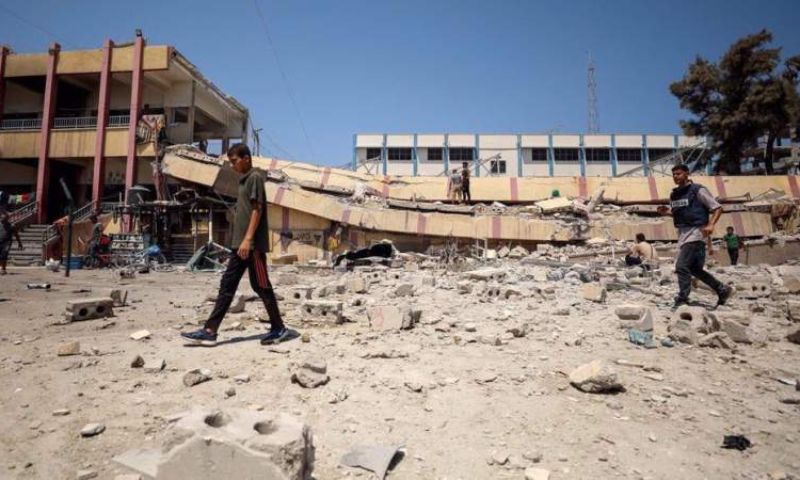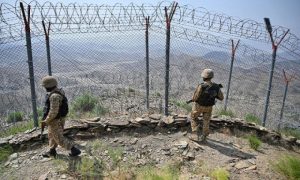GAZA: Israeli airstrikes across Gaza have killed at least 50 Palestinians in the past 24 hours, the territory’s health authorities reported, after US Secretary of State Antony Blinken wrapped up his visit to the Middle East aimed at securing the Gaza ceasefire agreement to halt the ongoing Israeli bombardments.
The Israeli military reported that its jets targeted approximately 30 sites throughout the Gaza Strip. Since October 7, Israel has launched an intense bombardment campaign in Gaza killing more than 40,223 Palestinians, mostly women and children, Gaza’s health authorities reported.
Meanwhile, on Wednesday, the Israeli military issued new evacuation orders for the densely populated area of Deir Al-Balah in central Gaza. This area has become a refuge for hundreds of thousands of displaced Palestinians seeking shelter from the ongoing Israeli violence. The evacuation orders were quickly followed by Israeli tank fire, which resulted in at least one death and multiple injuries from machine gun fire, according to local medics and residents.
The situation for the displaced residents in Deir Al-Balah remains dire. Many, like Aburakan, a 55-year-old displaced person from Gaza City, are struggling to find safety. “Where will we go? Where will we go?” he asked, expressing frustration and despair.
Having already moved multiple times since October, Aburakan and others in similar situations are finding it increasingly difficult to locate safe spaces away from the fighting. He voiced deep skepticism about the prospects of a ceasefire, saying, “Unfortunately, we may die before we see an end to this war. All ceasefire talk is a lie.”
The humanitarian crisis in Gaza has been exacerbated by the ongoing military operations, with much of the 2.3 million-strong population being internally displaced. The Israeli offensive has resulted in widespread destruction, flattening large portions of residential areas and critical infrastructure across the enclave.
US Secretary of State Antony Blinken concluded his trip to the Middle East without securing a truce deal. During his visit, Blinken met with leaders from Egypt, Qatar, and Israel, aiming to mediate a ceasefire. Blinken warned both Israel and Hamas his plan may be the last chance to avert a broader regional war.
The US top diplomat appealed to Hamas to urgently accept a US-backed truce proposal, while also entering into a public spat with Israel over its future presence in the besieged Gaza Strip.
“Time is of the essence,” Blinken said after stops in key mediators Egypt and Qatar as well as Israel on his ninth tour of the Middle East aiming to secure a ceasefire deal and halt Israel’s ongoing bombardment campaign in Gaza.
“With every passing day, more bad things can happen to more good people who don’t deserve it,” Blinken said before flying out of Doha. “This needs to get done, and it needs to get done in the days ahead, and we will do everything possible to get it across the finish line,” he said of the ceasefire proposal.
During his tour, Blinken presented ideas aimed at bridging the gaps between the conflicting parties and pressed Hamas to return to negotiations in Cairo this week through intermediaries Qatar and Egypt. However, his mission faced significant obstacles, including a public disagreement with Israeli Prime Minister Benjamin Netanyahu over the terms of the truce.
While Blinken had earlier indicated that Israel had agreed on the “schedule and location” for withdrawing troops from Gaza, Netanyahu’s insistence on maintaining control of the Philadelphi Corridor—a crucial border area between Gaza and Egypt—complicated the talks. Netanyahu’s stance was seen as a major sticking point.
A senior US official, speaking anonymously, criticized Netanyahu’s position, labeling his “maximalist statements” as detrimental to achieving a ceasefire. Blinken himself called for “maximum flexibility” from both sides, acknowledging the deep-rooted differences that continue to hinder progress.
Egyptian President Abdel Fattah al-Sisi, in his meeting with Blinken in El Alamein, stressed the urgent need to end the conflict, aligning with the broader Arab sentiment for a cessation of hostilities. Despite these appeals, the truce remained elusive.
In Doha, Blinken’s planned meeting with Qatari Emir Sheikh Tamim bin Hamad Al-Thani was delayed due to the Emir’s reported illness. Instead, they communicated via phone, as the diplomatic efforts continued to face challenges.
The ongoing Israeli violence in Gaza has intensified in recent days, with air strikes resulting in casualties. Reports indicate that at least three people were killed in overnight strikes, while the Israeli military claimed to have targeted around 30 sites in Gaza.
The situation has further deteriorated with an Israeli airstrike in Lebanon’s Sidon, which resulted in the death of a Fatah official. This incident marks the first attack on Fatah since the conflict began, potentially complicating ceasefire efforts.
Regional tensions also flared with a recent attack on a merchant vessel off Yemen, which was struck by projectiles. This incident is part of a broader campaign by Yemen’s Houthi movement against international shipping, in support of Palestinians in Gaza.
Lebanon’s health ministry said earlier Israeli strikes in the country’s east killed one person and wounded 20, hours after four were killed in the south.
Cross-border skirmishes have taken place almost daily between Israel and Lebanon’s Hezbollah, but fears of a greater crisis soared when Hamas’s political leader, Ismail Haniyeh, was killed on a visit to Tehran on July 31.
Iran has vowed retaliation, blaming Israel for the assassination, but has held off so far, with the United States sending additional forces and warning a wider war could destroy prospects for a Gaza ceasefire.
Efforts to negotiate a ceasefire have been complicated by mutual blame from Israel and Hamas for the delays, as well as ongoing humanitarian crises. The Israeli military has retrieved the bodies of six hostages from Gaza tunnels, who were reportedly killed during military operations.
























